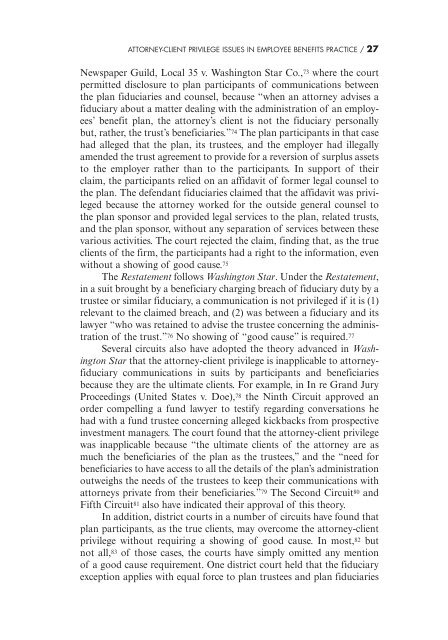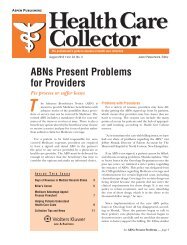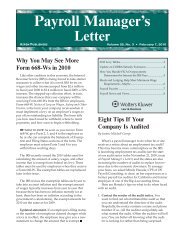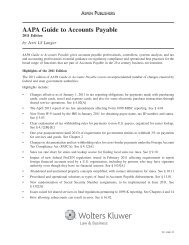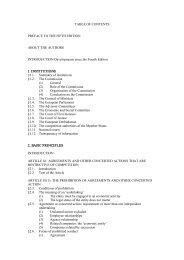journal of pension planning & compliance - Kluwer Law International
journal of pension planning & compliance - Kluwer Law International
journal of pension planning & compliance - Kluwer Law International
You also want an ePaper? Increase the reach of your titles
YUMPU automatically turns print PDFs into web optimized ePapers that Google loves.
ATTORNEY-CLIENT PRIVILEGE ISSUES IN EMPLOYEE BENEFITS PRACTICE / 27<br />
Newspaper Guild, Local 35 v. Washington Star Co., 73 where the court<br />
permitted disclosure to plan participants <strong>of</strong> communications between<br />
the plan fiduciaries and counsel, because “when an attorney advises a<br />
fiduciary about a matter dealing with the administration <strong>of</strong> an employees’<br />
benefit plan, the attorney’s client is not the fiduciary personally<br />
but, rather, the trust’s beneficiaries.” 74 The plan participants in that case<br />
had alleged that the plan, its trustees, and the employer had illegally<br />
amended the trust agreement to provide for a reversion <strong>of</strong> surplus assets<br />
to the employer rather than to the participants. In support <strong>of</strong> their<br />
claim, the participants relied on an affidavit <strong>of</strong> former legal counsel to<br />
the plan. The defendant fiduciaries claimed that the affidavit was privileged<br />
because the attorney worked for the outside general counsel to<br />
the plan sponsor and provided legal services to the plan, related trusts,<br />
and the plan sponsor, without any separation <strong>of</strong> services between these<br />
various activities. The court rejected the claim, finding that, as the true<br />
clients <strong>of</strong> the firm, the participants had a right to the information, even<br />
without a showing <strong>of</strong> good cause. 75<br />
The Restatement follows Washington Star . Under the Restatement ,<br />
in a suit brought by a beneficiary charging breach <strong>of</strong> fiduciary duty by a<br />
trustee or similar fiduciary, a communication is not privileged if it is (1)<br />
relevant to the claimed breach, and (2) was between a fiduciary and its<br />
lawyer “who was retained to advise the trustee concerning the administration<br />
<strong>of</strong> the trust.” 76 No showing <strong>of</strong> “good cause” is required. 77<br />
Several circuits also have adopted the theory advanced in Washington<br />
Star that the attorney-client privilege is inapplicable to attorneyfiduciary<br />
communications in suits by participants and beneficiaries<br />
because they are the ultimate clients. For example, in In re Grand Jury<br />
Proceedings (United States v. Doe), 78 the Ninth Circuit approved an<br />
order compelling a fund lawyer to testify regarding conversations he<br />
had with a fund trustee concerning alleged kickbacks from prospective<br />
investment managers. The court found that the attorney-client privilege<br />
was inapplicable because “the ultimate clients <strong>of</strong> the attorney are as<br />
much the beneficiaries <strong>of</strong> the plan as the trustees,” and the “need for<br />
beneficiaries to have access to all the details <strong>of</strong> the plan’s administration<br />
outweighs the needs <strong>of</strong> the trustees to keep their communications with<br />
attorneys private from their beneficiaries.” 79 The Second Circuit 80 and<br />
Fifth Circuit 81 also have indicated their approval <strong>of</strong> this theory.<br />
In addition, district courts in a number <strong>of</strong> circuits have found that<br />
plan participants, as the true clients, may overcome the attorney-client<br />
privilege without requiring a showing <strong>of</strong> good cause. In most, 82 but<br />
not all, 83 <strong>of</strong> those cases, the courts have simply omitted any mention<br />
<strong>of</strong> a good cause requirement. One district court held that the fiduciary<br />
exception applies with equal force to plan trustees and plan fiduciaries


